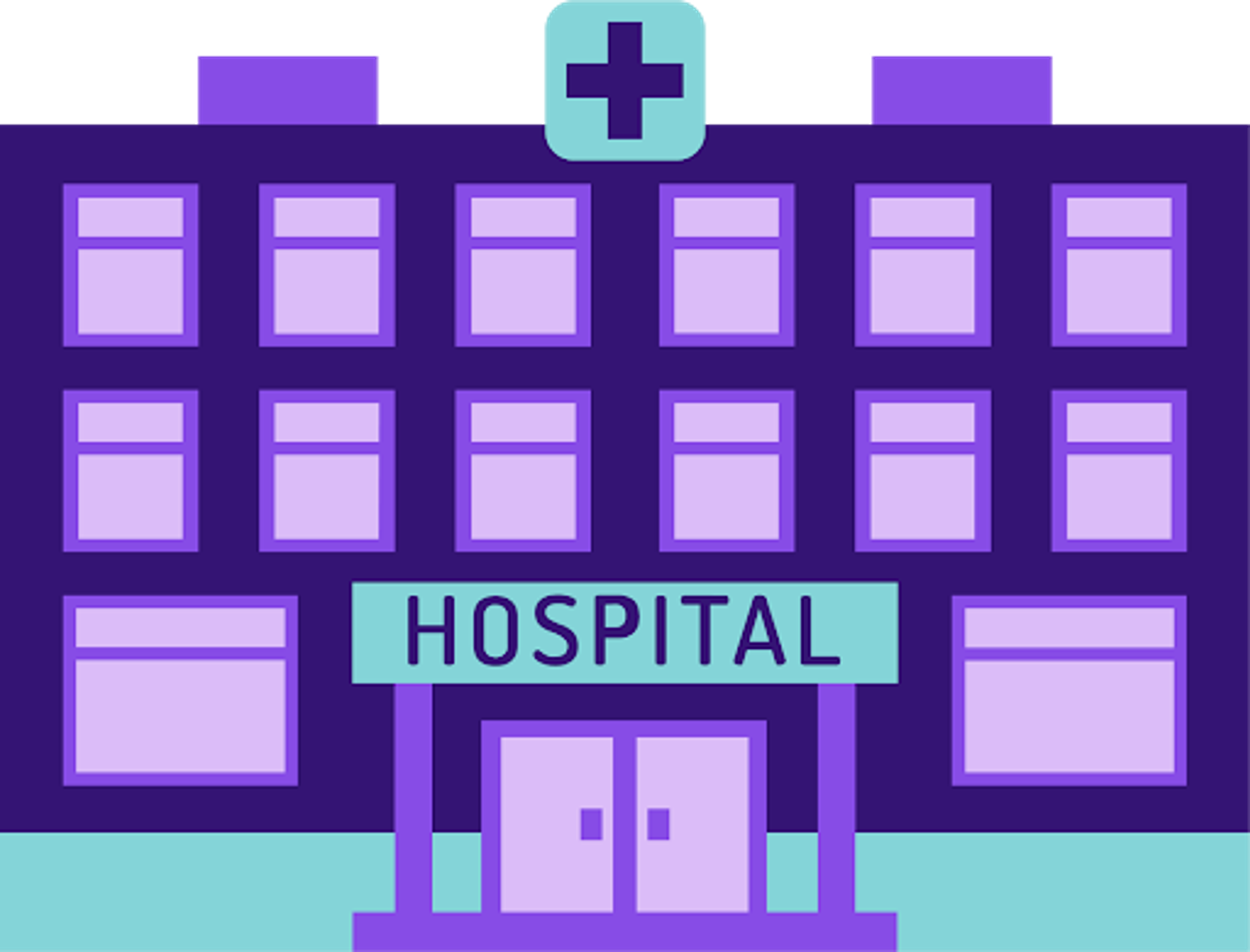What if I go to the ER after an abortion or a miscarriage?
Posted February 20, 2025

If you're having a medical emergency like very heavy bleeding, go to the emergency room closest to you.
You don't need to say anything about taking abortion pills or why you think you might be bleeding.
If you’re unsure of what’s normal or if you're having an emergency you can call or text Miscarriage and Abortion Hotline to talk with a medical professional at (833) 246-2632 between 8am - 1am ET daily.
If you are having trouble getting care at the hospital, you or your loved one can call the Repro Legal Helpline at (844) 868-2812 to speak with a lawyer.
Most people do not need emergency care after an abortion or miscarriage. Research shows that abortion is safe and complications happen in less than 1% of cases. And most miscarriages happen on their own without needing any medical support. Abortions and miscarriages are also the same process, so the medical treatment for both is the same. In fact, the medical term for a miscarriage is “spontaneous abortion” and usually refers to a loss before 20 weeks of pregnancy. You can read more about the similarities of medication abortion and miscarriage here.
You may be worried about getting into legal trouble for a pregnancy loss or worried if you’ll be able to get the medical care that you need. You aren’t alone! There is a lot of misinformation and fear around abortion care, especially depending on where you live. That’s why the Repro Legal Helpline and Ineedana.com teamed up to make sure that if you go to the ER after an abortion or a miscarriage, you will feel prepared.

Here’s what we want you to know:
- You have the legal right to get emergency medical care in an emergency room in every state, even if your state bans abortion. Emergency medical care includes treatment for a pregnant person in labor or having a miscarriage. You have this legal right no matter your age, immigration status, or whether you have insurance.
- You do not have to tell anyone about your abortion.
- You can bring someone you trust with you to the hospital so you don’t have to stand up for yourself alone. But keep in mind that hospitals can have different visitor policies.
- If you're bleeding a lot, you can say things like "I'm pregnant, I started bleeding and I'm very worried. I would like blood work and an ultrasound to figure out what's going on."
- You do not have to tell anyone what you want to do with a pregnancy, or if you change your mind about what you want to do.
- You have the legal right to travel between states for any reason and no matter your age, unless you’re under a court order like probation or parole. You don’t have to tell anyone why you’re traveling. No state makes it a crime for pregnant people to travel to another state for an abortion, but there can be reasons why traveling between states has legal risks. For example, your legal risk can depend on your immigration status. Call the Repro Legal Helpline at (844) 868-2812 if you’re not sure if you can travel.

How do I know if I need to go to the hospital?
- If you have very heavy bleeding and soak through more than 2 overnight maxi pads per hour for 2 hours in a row
- Running a fever of 101°F or greater
- A really foul smelling discharge with severe pain that isn't better with over the counter pain medications (like tylenol or ibuprofen), and fever are signs of an infection that should be treated immediately.
You can also call the Miscarriage + Abortion Hotline at (833) 246-2632 to discuss your symptoms—they can help you understand if you need medical attention. Check out this article for more information on what to expect when having a miscarriage.
What to expect at the hospital
You only have to share what you feel comfortable telling hospital staff. A healthcare provider only needs to know that you were pregnant, how far along you were (if you know), and what symptoms (e.g., bleeding, cramping, fever, etc.) you have. If you are more than 12 weeks pregnant, read more here. There is no law that says you have to tell anyone about having an abortion.
Unless you tell them, hospital staff probably will not know whether you had a medication abortion or a miscarriage.
Healthcare providers can't tell the difference between a medication abortion and a miscarriage by examining or testing you—the symptoms for both are the same. And if you need medical care after either, doctors will usually treat them in the same way.
When misoprostol is dissolved under the tongue or between the cheek and gum, and any leftover pieces are swallowed or spit out, doctors won’t be able to see the pills. But if misoprostol is placed in the vagina, a doctor might notice any leftover pill during an exam. That’s why many people prefer to take the pills by mouth.
You can read more about how to talk to a healthcare provider here.

What do I do if I go to a hospital and they refuse to help me?
Call Repro Legal Helpline at (844) 868-2812 or contact us through our secure online form to speak with a lawyer. Tell us that you’re being denied emergency medical care and we’ll get back to you immediately.
We encourage you to bring a friend or family member with you to the hospital, because you may be in a situation where you need to advocate for yourself. It’s hard to do that alone if you’re scared or in pain.
You, or your trusted person, should write down (on paper or in a Notes app on your phone) everything that happens, including:
- The name of the hospital
- Any treatment you are offered and/or receive
- What the hospital staff says to you and any reasons they give about why they will not treat you
- The names of the nurses, doctors, or other staff you talk to
- The date and time you arrived and left the hospital
We recommend you write or use your Notes app instead of recording at the emergency room, because some states do not allow people to record others without their permission.
You or your trusted support person should also call the Repro Legal Helpline (844-868-2812) as soon as possible. If you do not have someone with you that you trust, you can ask the hospital for a patient advocate. Keep in mind that a patient advocate is not a lawyer and everything you tell them will be written down and kept by the hospital.
If you feel comfortable, you can:
- Ask why you are being denied care and that they put their reason in your medical chart
- Tell them: “I have the right to stabilizing medical care under the Emergency Medical Treatment and Labor Act (EMTALA).”
- Ask the hospital to transfer or transport you to another hospital that will provide you care that you need
- Ask how to request your medical records, including a copy of labs and imaging, and to sign up for the online patient portal, like MyChart, if you haven’t already
Make sure to write down in your notes that you asked these questions and their answers.
If you forget to take notes, or can’t, that’s okay. When the emergency is over, you can write down everything you remember, or call the Repro Legal Helpline (844) 868-2812 and tell us what you remember. The Repro Legal Helpline is free and confidential.

What do I do if the hospital calls the police?
Do not talk to the cops
Tell the police that you will not talk to them without a lawyer present. It is always better for you, no matter what, to talk to a lawyer before you answer questions from a police officer. You have the right to remain silent, or to have a lawyer with you if you do answer any questions. After you refuse to talk to the police without a lawyer, call or have a loved one call the Repro Legal Helpline at (844) 868-2812 immediately. Be sure to tell Repro Legal Helpline that you’ve been contacted by the police and include a phone number where you can be reached.
You may need to be careful about talking to anyone at the hospital
Hospitals are not supposed to share your private medical information with the police. But, sometimes doctors, nurses, or other hospital staff may do that anyway, and people who work with cops, like a social worker or child protective services worker, might try to question you too. Any of those people might tell the police what you say. You don’t have to talk to them. You can always say, “I’m not comfortable answering your questions and I want to talk to a lawyer first.” then contact the Repro Legal Helpline.
Learn more about your rights when contacted by police, immigration, or CPS here.
If you’re a medical professional:
You are not required to give or facilitate police access to your patients, especially if doing so will put your patient’s condition at risk. You can:
- Ask to see a warrant
- Tell your patient they have the right to remain silent and talk to a lawyer first
- Stay with your patient if police insist on questioning them.
As you know, HIPAA protects all medical care, and there are special protections for sexual and reproductive health care. And in many states, state medical privacy laws are even more protective. For these reasons, it would be very unusual for you to need to report the fact of a self-managed abortion to child welfare, immigration authorities, or police, and doing so is often a HIPAA violation.
If you’re a healthcare provider with questions about reproductive healthcare including miscarriage or abortion, you can call the Reproductive Health Hotline staffed by UCSF clinicians at (844) 737-7644.
If you have questions about the law, you can contact If/When/How or, if you need specific legal advice, you can contact the Abortion Defense Network. You can also contact the Repro Legal Helpline on behalf of your patient if you believe that your patient is being denied emergency medical care or the hospital has reported your patient to the police. Learn more about how you can interrupt criminalization as a healthcare provider here.
If you’re a doctor in an emergency department, you can also check out Access Bridge’s protocol and learn about how to ensure patients receive the reproductive healthcare they need.

Are some emergency rooms better than others?
Not everyone has a choice of more than one hospital. You might live near only one hospital with an emergency room. Or you might have insurance that pays for only certain medical centers. Even if you have only one option, that emergency room has to take care of you in a medical emergency.
If you have more than one hospital option and want to be prepared in case you ever need to go to the hospital, it can be helpful to do some research ahead of time. You can call hospitals or doctor’s offices and try asking:
"Hi, I’m calling to get some information about miscarriage management at your hospital. Can you connect me with someone who can answer questions about hospital policies and available treatment options?"
- (You may need to ask for Labor & Delivery, the Emergency Department, or a patient advocate.)
"Can you tell me about your hospital’s miscarriage management guidelines?"
- (If they seem unsure, you can clarify: “I’m specifically asking about how early pregnancy loss is treated and whether there are standard protocols in place.”)
"When a patient is experiencing a miscarriage, are doctors expected to go over all three management options—watch and wait, medication, and a procedure?"
- (Follow-up: “Will the doctor allow the patient to choose their preferred treatment, or are there restrictions on certain options?”)
"Does your hospital have doctors who are trained in D&E (dilation and evacuation) procedures? Are any of them fellowship-trained in Complex Family Planning?"
- (If they don’t know, ask: “Is there someone in OB/GYN I can speak to who might know?”)
"If a patient needs a higher level of care or a procedure your hospital doesn’t provide, what is the process for transferring them to another facility?"
- (Follow-up: “Does the hospital have any policies that could delay or prevent a transfer?”)
"Is your hospital Catholic-affiliated or connected to a religious system that restricts miscarriage or abortion care?"
- (If they seem unsure: “Do your hospital policies allow for miscarriage management even if there is still a fetal heartbeat?”)
Keep in mind:
- It may be hard to get someone on the phone or even have these questions answered by hospital staff. You can try connecting with a local pregnancy/birth doula who may have a better idea on hospital policies and people’s experiences too.
- In some communities the only available hospital or healthcare providers available are religiously affiliated (i.e., most likely anything with “St.” in the name)
- Some people live in very small towns where everyone knows everyone and it’s hard to keep things private.
And remember, you know your community and where you live best and how providers may react.
If you’re not experiencing a medical emergency and just want to get checked out after a miscarriage or abortion, you do not have to go to the emergency room. You’re already in the right place to find trusted medical providers who offer abortions.
Find trusted providers that can help with miscarriage management
Loved this article?
Share our latest Instagram post with your friends and spread accurate information!


